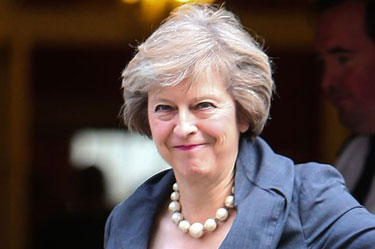PM observes ‘coming together’ after Brexit in Easter message
 Bangla sanglap Desk: Theresa May has spoken of a “sense of people coming together” following the UK’s vote to leave the EU.
Bangla sanglap Desk: Theresa May has spoken of a “sense of people coming together” following the UK’s vote to leave the EU.
In her first Easter message as PM, she said “opportunities” would arise from Brexit and emphasised the UK’s “shared ambitions and above all shared values”.
She said people should feel “confident” about Christianity’s role in society and free to speak about their faith.
Labour leader Jeremy Corbyn said the Easter message of peace “could not have more urgency throughout the world”.
Mrs May, who is a vicar’s daughter, said that shared values “can and must bring us together” following the UK’s vote to leave the EU by 52% to 48% in June 2016.
“This year, after a period of intense debate over the right future for our country, there is a sense that people are coming together and uniting behind the opportunities that lie ahead,” she said.
Mrs May, who recently criticised a decision to drop the word Easter from the name of an annual egg hunt, also spoke of her Christian upbringing in a village vicarage.
She said she learned “compassion, community and citizenship” but that they are values we “all hold in common”.
“These are values that are visibly lived out every day by Christians as well as by people of other faiths or none,” she said.
Her comments echo those of predecessor David Cameron, who used last year’s Easter message to say the country must “stand together” and defend Christian values.
Mrs May also used her message to highlight believers in other countries who “practise their religion in secret and often in fear”.
She said the UK has a “strong tradition” of religious tolerance and freedom of speech.
“We must be mindful of Christians and religious minorities around the world who do not enjoy these same freedoms,” she said.
“We must do more to stand up for the freedom of people of all religions to practise their beliefs openly and in peace and safety.”
‘Nostalgic nationalists’
Mr Corbyn said Christians throughout the world would be remembering “Jesus’ example of love and sacrifice, and the Easter message of redemption and peace”.
“At a time of growing conflict, that message of peace could not have more urgency throughout the world,” he said.
“We hear painful stories every day, of homelessness, poverty or crisis in our health service – or across the world, of the devastating consequences of war and conflict, including millions forced to become refugees.
“We need to respond to these problems head-on, through action and support for social justice, peace and reconciliation. Those principles are at the heart of Christianity.”
Liberal Democrat leader Tim Farron discussed the row over the name of the egg hunt in his Easter message, suggesting it had had little to do with Christianity but was more about holding on to “something comfortable and traditional”.
“Given that we are turning the clock back to the early 1970s with Brexit (or indeed the 1580s if we do end up declaring war on Spain), then nostalgia is most definitely the mood of the moment,” he said.
“I don’t want the Christian message to be stolen by the nostalgic nationalists, just as no Liberal should seek to appropriate Jesus for their own purposes either.
“But the Easter message is one of internationalism, if you like – Jesus died for you no matter who you are or where you are from.”
National Secular Society president Terry Sanderson said: “We are the only country in the world with bishops in our Parliament, we have an established church, a third of our schools are Christian and we pride ourselves as one of the countries with the greatest religious freedom.
“It is therefore difficult to take seriously any suggestion that Christians in the UK are not free to talk about or practise their faith.”
British Humanist Association chief executive Andrew Copson said: “Mrs May is right to speak up for the need to ensure freedom of religion around the world.
“But whenever one does this, it is vital not to forget the freedom of the non-religious to also openly hold and live out their beliefs. In many parts of the world it is effectively impossible to be openly non-religious, with blasphemy and apostasy punishable by death.”



